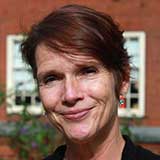 After a hiatus of more than 18 months, blogger Sandra Lako provides an update from Sierra Leone, where she has been working for the past nine years, improving access to and quality of healthcare for women and children. “A year ago I would not have believed anyone who told me that I would be in the middle of an Ebola outbreak in January 2015,” she writes. “A confirmed Ebola case in West Africa never crossed my mind. Even in May of last year, when the first positive case in Sierra Leone was announced, I could not imagine the extent to which this virus would spread throughout Sierra Leone. No one was ready for the battle we are up against.” Read more about her unique insight into the outbreak.
After a hiatus of more than 18 months, blogger Sandra Lako provides an update from Sierra Leone, where she has been working for the past nine years, improving access to and quality of healthcare for women and children. “A year ago I would not have believed anyone who told me that I would be in the middle of an Ebola outbreak in January 2015,” she writes. “A confirmed Ebola case in West Africa never crossed my mind. Even in May of last year, when the first positive case in Sierra Leone was announced, I could not imagine the extent to which this virus would spread throughout Sierra Leone. No one was ready for the battle we are up against.” Read more about her unique insight into the outbreak.
The BMJ and its sister products are continuing to follow the Ebola outbreak—see our special resources page here—all articles are free to access. And, last but not least, our latest Christmas charity appeal has done amazingly well: so far, we have raised about £35 000 for Médecins Sans Frontières. The charity is bringing much needed medical personnel to west Africa to help with the ongoing Ebola outbreak. You can still support MSF’s vitally important work by donating here.
On the subject of funding and science, a recent Observations column explains how social media and “crowdfunding” can boost patient and public involvement in biomedical research. “Organisations such as the National Institute for Health Research … are doing excellent work in promoting the need for better and more active patient and public involvement in biomedical research, and many local patients’ groups are working in the same direction. However, this does not mean that we, the health professionals and researchers, should not explore other routes to promote research and supplement the hard work of the patient and public involvement officers around the UK. Crowdfunding and modern communication technologies might help to bring people closer to science and allow them to contribute in the best way they see fit,” writes author Gregory C Makris.
I finish with Richard Lehman, who, in his weekly review of the general medical journals dreams about setting up an undergraduate Medicine and Humanities course, but finds that “I’ve never proceeded further than occasionally helping teach clinical students in a ‘Medicine and Literature’ special study module. To me the main point is to teach the students that medicine provides just a partial and distorted insight in the totality of life. Any texts involving doctors are out. For me, the course should be mainly about teaching young aspiring doctors—increasingly from privileged and professional families—how unimportant they are. There are so many other people telling them the opposite. These weeks should be spent impressing on them what a tiny realm of discourse medicine is when regarded within the unbounded totality of human thought and expression.” This sounds like an important lesson to all students, of whatever discipline.
Birte Twisselmann is web editor and obituaries editor, The BMJ.